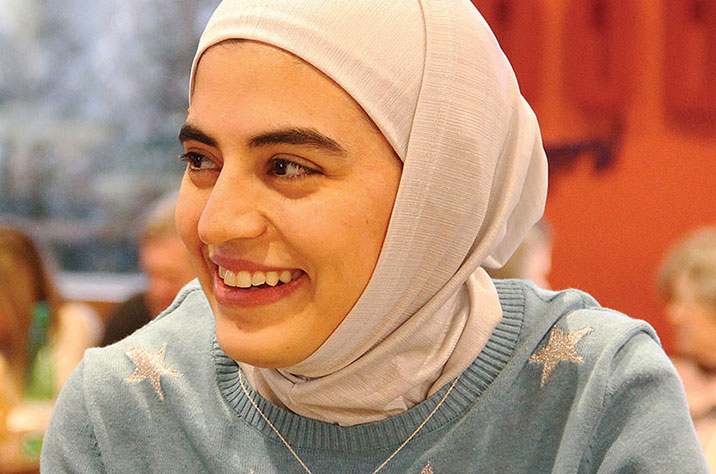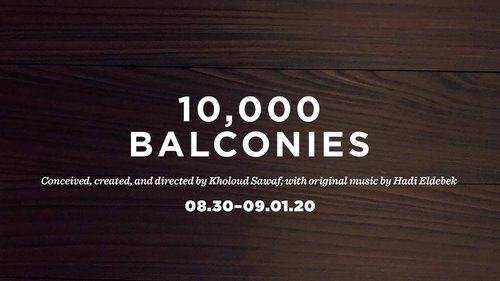
Kholoud Sawaf / Courtesy photo
Kholoud Sawaf describes herself as “not a typical playwright” working in “not a typical process.”
“I have ideas and sometimes I write something and sometimes we improvise something and sometimes we devise something using props or a prompt or a piece of clothing or a song, and we create a scene or a moment. It’s a series of moments that are put together in a specific order to create the story.”
Sawaf is describing the creation of “10,000 Balconies,” a work-in-progress that will have five workshop performances in the Spring Theatre, TheatreSquared’s new black box space. Sawaf also directed the production.

What: “10,000 Balconies”
When: 8 p.m. Aug. 30; 2:30 and 8 p.m. Aug. 31; 2:30 p.m. and 7 p.m. Sept. 1
Where: TheatreSquared’s Spring Theatre
Cost: $22; a limited number of $10 are available for those under 30 years old; recipients of SNAP benefits are eligible for a $5 ticket
Tickets: 479-777-7477 or theatre2.org
Loosely inspired by Shakespeare’s “Romeo and Juliet,” Sawaf’s play is set in modern-day Damascus, and weaves together vignettes made up of dialogue (some of it in Arabic), poetry, movement and original music to tell myriad stories set in Syria’s capital city, which is also Sawaf’s hometown. Eight actors and two musicians, all of middle eastern descent, portray numerous characters. It will be the largest cast of people of color to appear in a TheaterSquared production.
The play begins in 2010, shortly before the civil uprising in Syria, and the timeline of the play coincides with the civil war that is still raging in that country. Although the civil war is an important element in the play, one of Sawaf’s goals in “10,000 Balconies” is to show her homeland as something other than a war zone as well as to push back on commonly held stereotypes of the middle east.
“It’s often you see plays now about Syria and they all want to tell a war story,” she said in a recent interview. “Of course, we can’t ignore what’s going on, but I hate it when my country gets reduced to a civil war. I hate it when my country gets reduced to just one moment in history.”
Indeed, Damascus is widely believed to be the oldest continuously inhabited city in the world, with evidence of habitation dating back at least 11,000 years. Clearly, there is a lot more to Syrian history and culture than the current conflict, and Sawaf wants audiences to know that.
Sawaf has been working on “10,000 Balconies” for the past three years. Born and raised in Damascus, she earned a B.A. in mass communications from the American University of Shajarah in the United Arab Emirates. She came to the University of Arkansas in 2012. After earning an M.F.A. in theater directing in 2015, she spent the summer in Ithaca, New York, as a member of the Hangar Theatre Lab Company, an intensive training program for early-career theatre professionals. There, she and the other young directors were assigned to work on a project of their own conception, and encouraged to tackle something new and unfamiliar. The result was “R&J Damascus,” a retelling of Shakespeare’s familiar tragedy, but in a new setting.
“The idea of Shakespeare came to me then because I had always related to his world, but am distanced from his words, naturally, because of the language barrier,” said Sawaf, whose English, though not her native language, is excellent. “There are elements of his world that really speak to me. We played with it and there was definitely a spark there.”
In collaboration with TheatreSquared, she won a major grant from the Building Bridges Program of the Doris Duke Foundation for Islamic Art to continue working on “R&J Damascus.” The grant also enabled her to get a three-year visa allowing her to work and travel within the U.S.
Sawaf directed an early version of part of the play at the Arkansas New Play Festival in 2016. In its early stage, “R&J Damascus” hewed very closely to the Shakespeare original. After several years of rewriting, rethinking, two workshops in New York City and a week holed up at a writer’s retreat in Eureka Springs, the play evolved into “10,000 Balconies.”
“It seems like my heart wanted to bring a bigger picture to the city and the stories that are happening at a time in history from this place,” she said. “One of them is the love story, though it is not necessarily as prominent as in ‘Romeo and Juliet.’ It’s also a love letter to Damascus. I can’t help but to have that.”
Sawaf is excited to have an opportunity to workshop the play further. “You sit by yourself and work on a play, and you think a scene is set and ready to go,” she said. “It’s a whole new thing to test something new with an audience for the first time.”

